Aloe vera may support skin health, digestion, and overall wellness when used safely and appropriately. This succulent plant has been valued for centuries and continues to be studied for its nutritional and functional benefits. Understanding how aloe vera supports health can help you make informed choices about the products you use and how to incorporate them into a balanced lifestyle.

Modern research shows aloe vera contains more than 75 active compounds, including vitamins A, C, E, B12, folate, enzymes, minerals (calcium, magnesium, zinc), amino acids, and polysaccharides—all of which may contribute to its biological effects. Whether applied topically or consumed in food-grade gel or juice form, aloe vera offers several evidence-based benefits.
What Is Aloe Vera? (Overview and Nutrition Profile)
What Is Aloe Vera?
Aloe vera (Aloe barbadensis Miller) is a succulent plant native to arid regions of North Africa and widely cultivated worldwide for its gel-filled leaves, valued in both traditional and modern wellness practices. The plant’s thick, fleshy leaves contain two distinct parts:
- Inner gel: The clear, mucilaginous substance used in foods, beverages, cosmetics, and dietary supplements. This portion is hydrating and rich in beneficial polysaccharides like acemannan.
- Latex (yellow sap): Found just under the leaf rind, it contains anthraquinones (such as aloin) with strong laxative properties. The U.S. Food and Drug Administration (FDA) has ruled that aloe latex is not recognized as safe or effective for over-the-counter laxative use because of potential side effects (FDA Federal Register, 2002).
When properly purified, the decolorized inner-leaf gel is generally considered safe for topical and short-term oral use. According to the National Center for Complementary and Integrative Health (NCCIH), Aloe vera has been studied for skin hydration, minor burn care, digestive comfort, and metabolic support—although more standardized human research is needed to confirm its broader health effects.
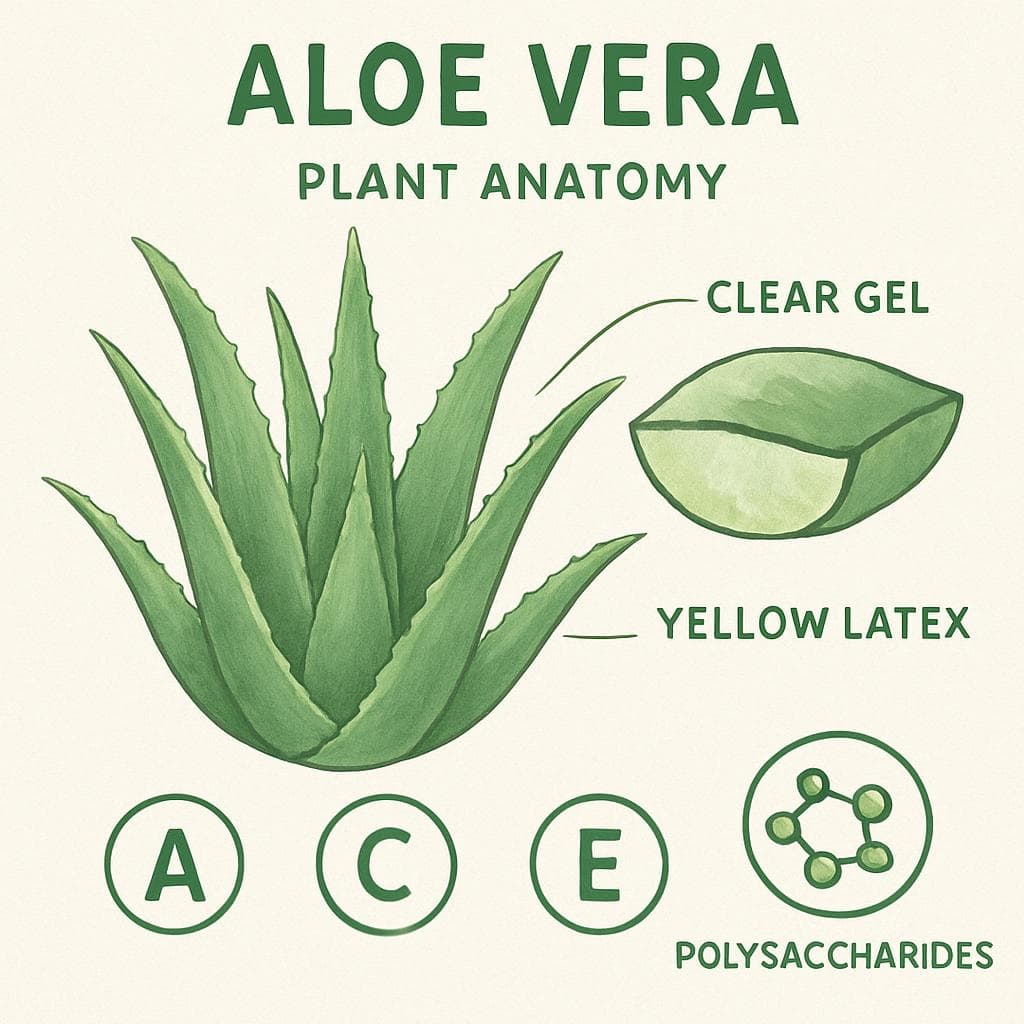
Nutrition Profile of Aloe Vera (Per 100 g of Inner Gel)
(Source: USDA FoodData Central, 2024)
| Nutrient | Amount | Potential Function |
|---|---|---|
| Calories | 15 kcal | Very low in calories; supports hydration |
| Water | ~96 g | Promotes fluid balance and skin hydration |
| Vitamin C | 9 mg | Antioxidant; supports collagen formation |
| Vitamin A (beta-carotene) | Trace | Contributes to skin and eye health |
| Calcium | 8 mg | Supports bone and muscle function |
| Magnesium | 6 mg | Assists in enzyme activity and nerve health |
| Potassium | 120 mg | Maintains electrolyte balance |
| Polysaccharides (Acemannan) | — | Supports digestion and immune function |
Key Takeaway
Aloe vera is a nutrient-dense, hydration-supporting plant whose clear inner gel provides vitamins, minerals, and antioxidants that may help support skin, digestive, and metabolic health. For safe use, always choose decolorized, inner-leaf aloe products verified by reputable manufacturers.
10 Proven Health Benefits of Aloe Vera (Backed by Science)
Aloe vera may support skin, metabolic, and digestive health through its hydrating polysaccharides, antioxidants, and nutrients. Modern research continues to explore its topical and oral benefits, emphasizing safe, evidence-based use.
1. Supports Skin Hydration and Barrier Function
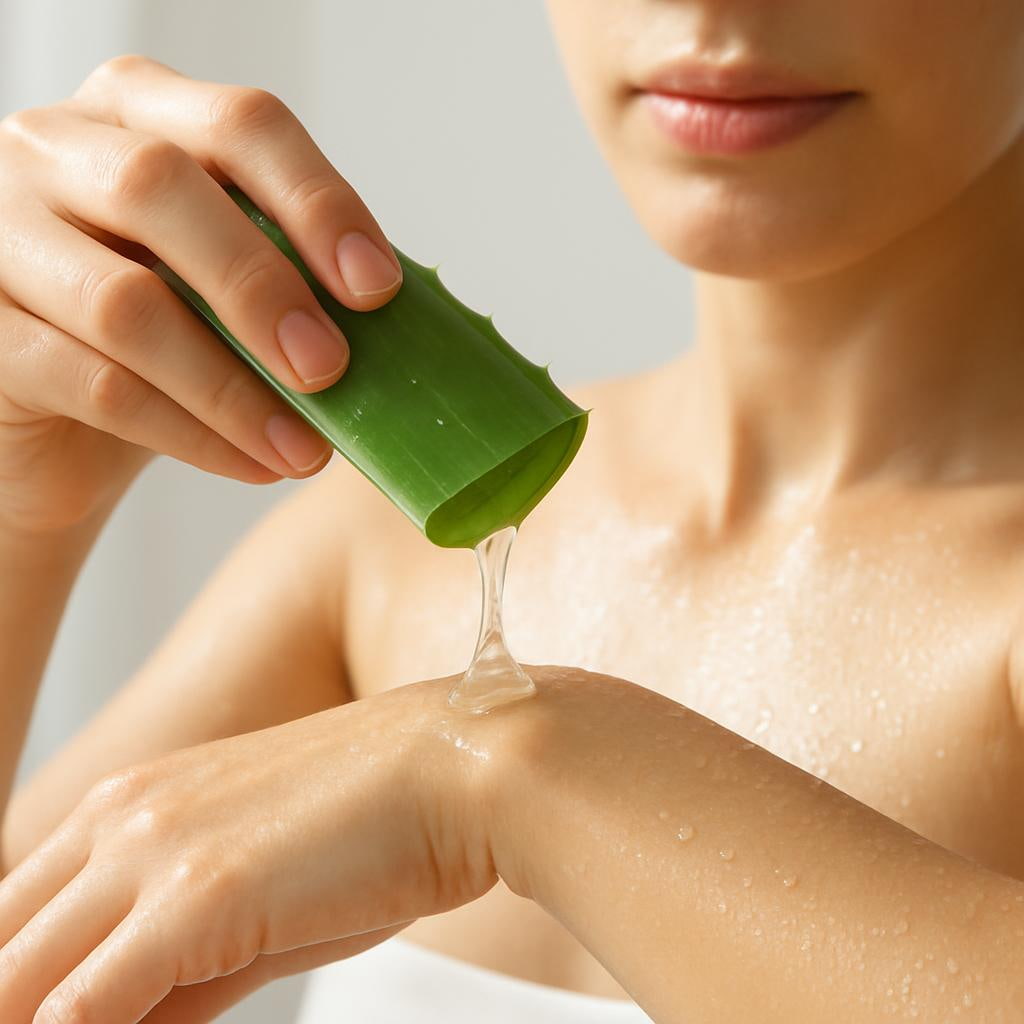
Aloe gel acts as a natural humectant, drawing moisture into the skin and helping maintain barrier integrity. Its polysaccharide acemannan enhances hydration, elasticity, and overall texture.
A clinical summary from the Mayo Clinic (2024) notes that aloe-based creams may help relieve dryness and support moisture retention without clogging pores. Additional dermatology research in Frontiers in Pharmacology (2023) confirms improved hydration in aloe-treated skin compared with placebo.
Tip: Apply pure, fragrance-free aloe gel or dermatologist-tested moisturizers to support daily skin hydration, especially after sun exposure or cleansing.
2. May Promote Wound Recovery and Minor Burn Relief
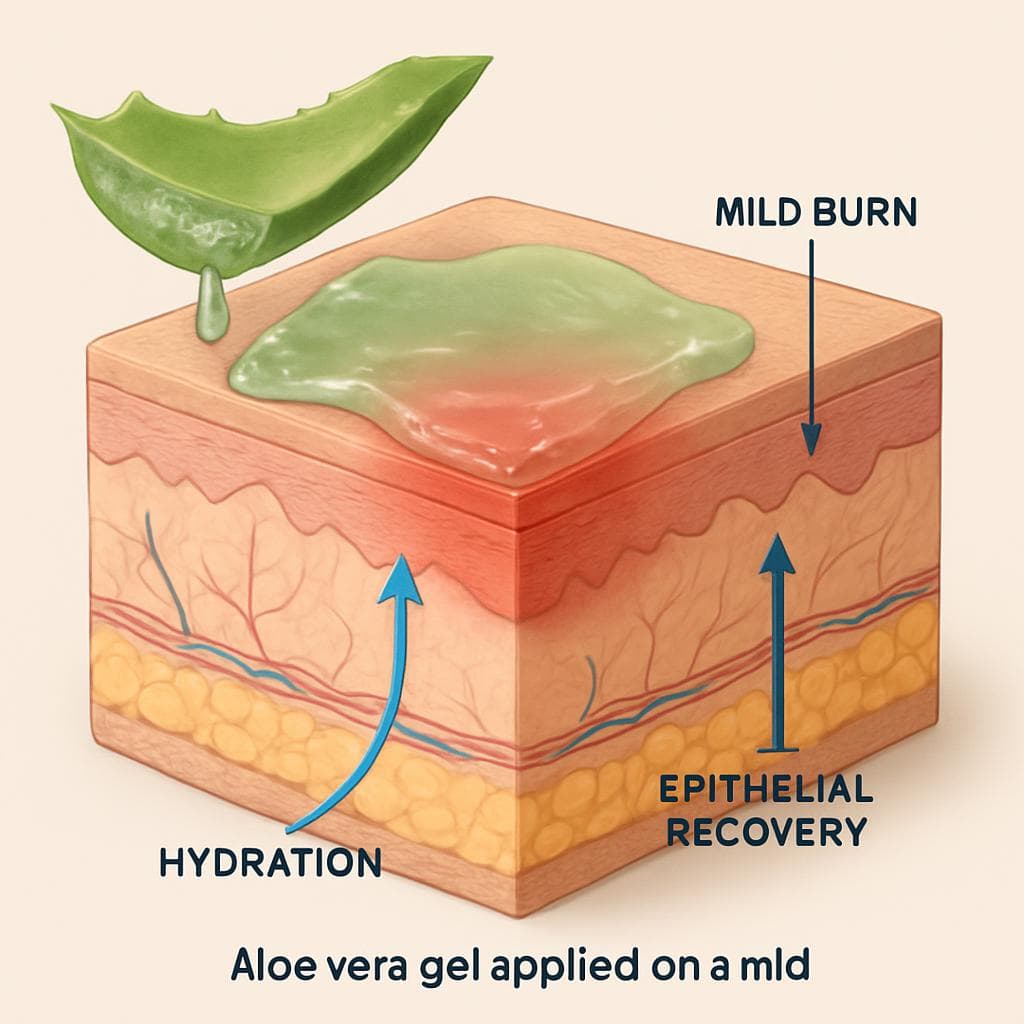
Aloe vera may support faster recovery in minor burns and superficial wounds when used topically.
A 2023 systematic review and meta-analysis published in The Journal of Burn Care & Research found that aloe vera reduced wound-healing time by an average of 3.76 days for second-degree burns compared with conventional dressings. Researchers attribute these effects to aloe’s mucopolysaccharides, glycoproteins, and antioxidant compounds, which support skin moisture balance, protect against oxidative stress, and promote epithelial repair.
According to the National Center for Complementary and Integrative Health (NCCIH), aloe gel from the inner leaf is generally safe for topical use, while latex-containing or unpurified whole-leaf products may irritate or dry the skin.
3. Provides Antioxidant and Anti-Inflammatory Compounds
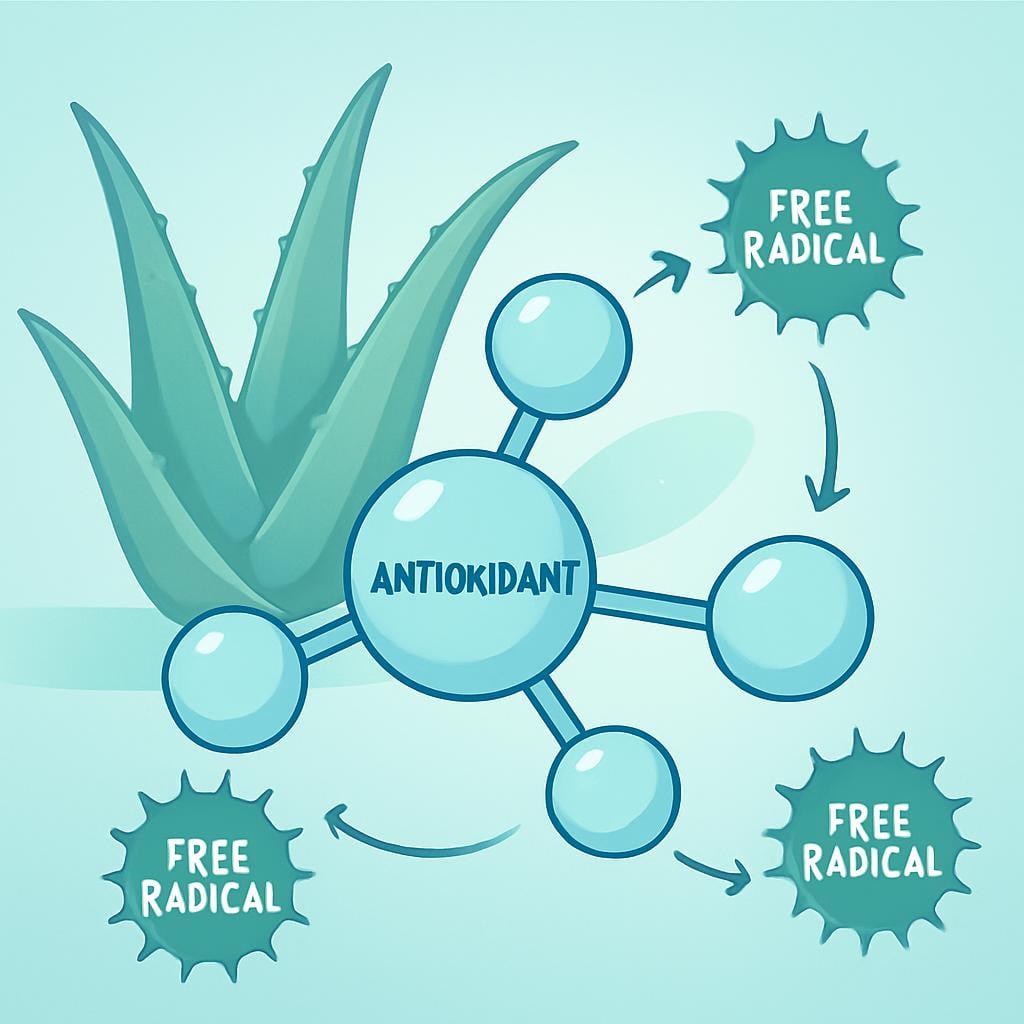
Aloe vera contains powerful plant antioxidants and anti-inflammatory compounds that may help support overall wellness and skin health.
The gel inside aloe leaves is rich in polyphenols, vitamins A, C, and E, and natural enzymes, all of which work together to help neutralize free radicals and support the body’s natural defense against oxidative stress.
A 2024 study published in MDPI Proceedings reported that Aloe vera extract significantly reduced reactive oxygen species (ROS) and the inflammatory cytokine interleukin-8 (IL-8) in human keratinocyte (HaCaT) cells, indicating potential antioxidant and anti-inflammatory activity at the cellular level. These properties suggest aloe’s bioactive compounds may support skin resilience and metabolic balance when used regularly as part of a healthy diet or skincare routine.
Additional reviews in Frontiers in Pharmacology (2023) highlight that aloe polysaccharides (acemannan) may further enhance antioxidant enzyme activity such as superoxide dismutase (SOD) and glutathione peroxidase (GPx), reinforcing its role in protecting tissues from oxidative damage.
4. May Support Digestive Comfort
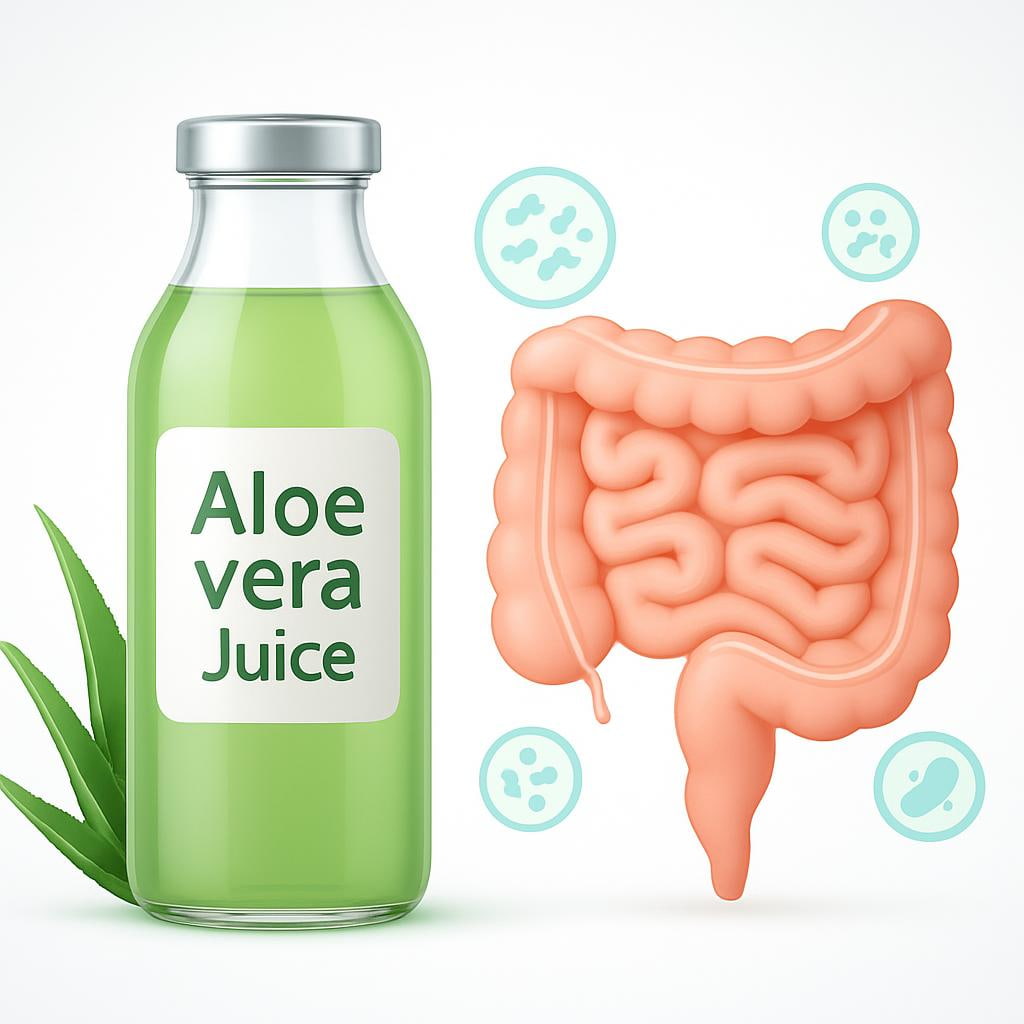
Aloe vera may support digestive comfort and gut health when consumed in its purified, decolorized inner-leaf form.
Recent research suggests aloe polysaccharides help maintain intestinal balance and hydration while supporting the natural digestive process. A 2025 review in Frontiers in Nutrition reported that aloe vera’s bioactive compounds—particularly acemannan and glucomannan—may improve gut mucosal integrity and promote beneficial gut microbiota activity, potentially easing occasional digestive discomfort.
It’s important to distinguish between aloe gel and aloe latex. The clear inner-leaf gel used in food and beverages is generally recognized as safe when properly purified. However, the yellow latex portion found just under the leaf rind contains anthraquinones, such as aloin, which act as stimulant laxatives and can cause gastrointestinal side effects.
5. May Support Blood Sugar Management
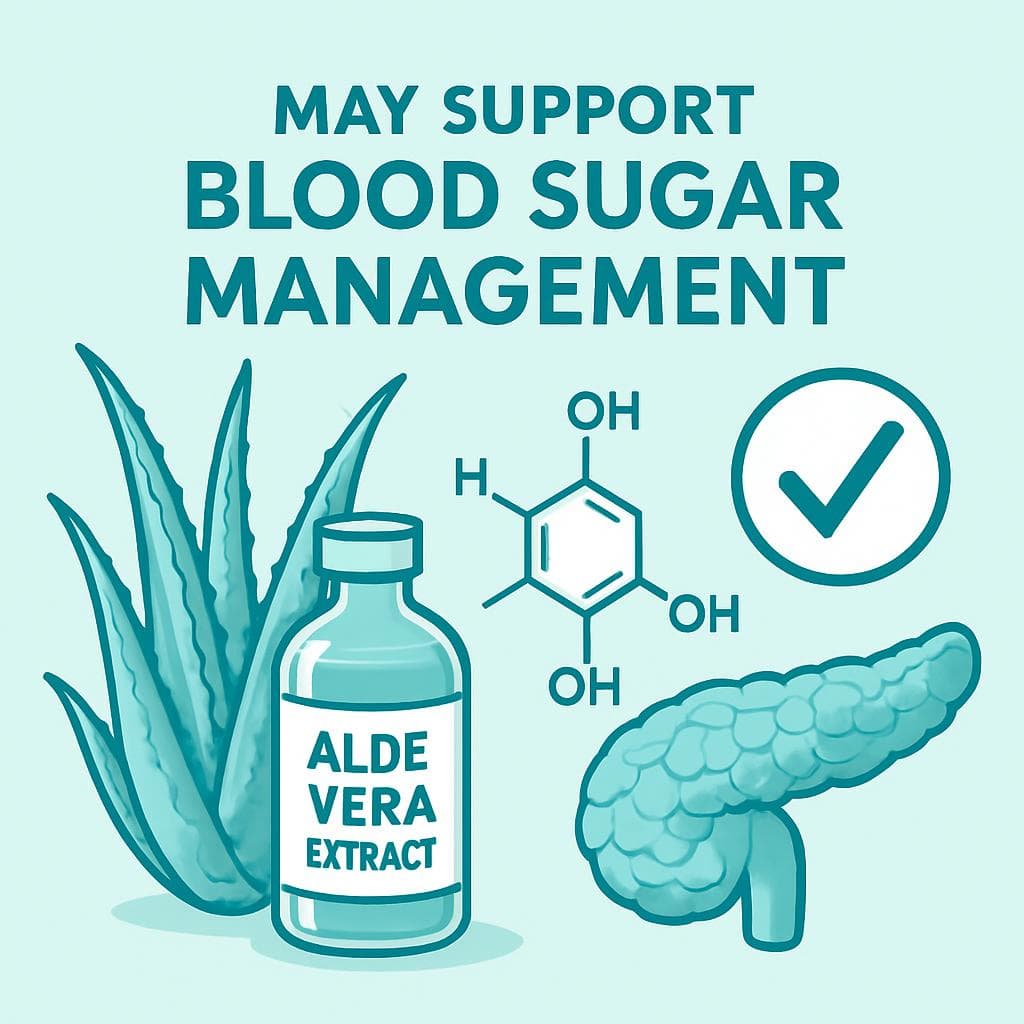
Emerging research suggests aloe vera supplements may support healthy glucose metabolism. A 2022 meta-analysis in Phytotherapy Research found modest reductions in fasting blood glucose and HbA1c among adults with prediabetes or type 2 diabetes.
The National Center for Complementary and Integrative Health (NCCIH) advises using aloe only under medical guidance, as evidence remains preliminary.
Tip: Combine aloe supplementation with balanced meals and regular activity; discuss with your clinician if you take glucose-lowering medication.
6. May Support Healthy Cholesterol Levels

Aloe’s phytosterols and soluble fibers may help support lipid balance. A 2023 review in Journal of Ethnopharmacology reported slight reductions in total and LDL cholesterol after 8–12 weeks of aloe gel intake, likely related to improved antioxidant capacity.
Because supplement formulations vary, results should be interpreted cautiously.
Note: Opt for standardized aloe gel extracts from reputable sources; avoid unregulated whole-leaf or latex products.
7. Supports Oral and Gum Health
Aloe vera gels and mouth rinses may help maintain oral hygiene by reducing dental plaque and gum irritation. In a 2022 trial published in Journal of Clinical Dentistry, aloe-based rinses performed similarly to chlorhexidine for mild gingivitis, with fewer side effects like staining or taste alteration.
Its natural compounds—acemannan and glucomannan—exhibit mild antimicrobial and soothing effects.
Tip: Choose alcohol-free aloe mouth rinses certified by dental organizations such as the American Dental Association (ADA).
8. May Support Immune Function

The polysaccharide acemannan found in aloe vera may support immune balance by influencing macrophage and cytokine activity. Early data from the NIH Office of Dietary Supplements (2024) highlight aloe’s potential to help maintain immune function, though larger human studies are needed.
Tip: Pair aloe juice with foods rich in vitamin C (like citrus or kiwi) to complement your daily immune-support nutrition.
9. May Support Healthy Weight and Metabolism

Preliminary evidence suggests aloe vera extract may influence lipid metabolism and gut microbiota. A 2023 study in Nutrients found participants who consumed decolorized aloe gel experienced modest improvements in metabolic markers.
These effects likely stem from aloe’s fiber-like polysaccharides that may promote satiety and support healthy digestion.
Note: Aloe should not replace balanced meals or exercise; consider it an adjunct to a wholesome lifestyle.
10. May Support Scalp and Hair Hydration
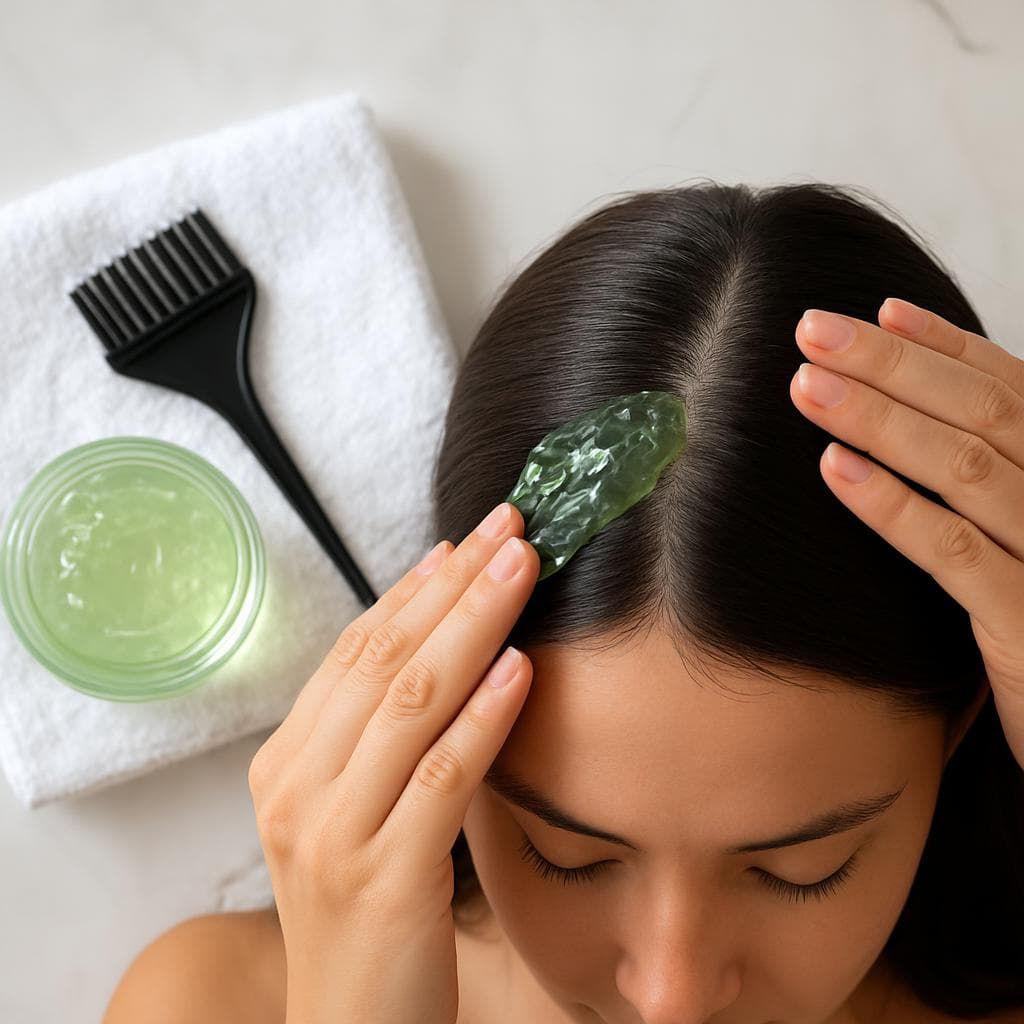
Aloe vera may support scalp hydration and hair manageability through its natural humectant and nutrient-rich composition.
The clear gel from aloe leaves contains vitamins A, C, and E, amino acids, and enzymes that may help retain moisture, remove excess oil, and soothe scalp irritation. According to WebMD (2024), aloe vera provides fatty acids and antioxidants that may promote a balanced scalp environment and reduce dryness or buildup.
Dermatologists often recognize aloe as a gentle, plant-based conditioner suitable for sensitive scalps. A 2024 overview from Healthline notes that applying aloe gel directly to the scalp may help improve moisture levels and reduce flaking or itchiness linked to minor scalp irritation. While research on hair growth remains limited, evidence supports aloe’s role in improving overall scalp comfort and hair softness.
Possible Side Effects and Precautions
Aloe vera is generally safe for most adults when used appropriately, but side effects can occur depending on the form and dosage. Understanding topical versus oral safety helps ensure proper use.
Topical Safety
Topical application of pure inner-leaf aloe gel is typically well tolerated. Mild redness, itching, or stinging may occur in sensitive individuals, especially when using fragranced or additive-containing products.
According to the National Center for Complementary and Integrative Health (NCCIH, 2024), topical aloe gel is widely used for skin hydration, sunburn relief, and irritation management with a strong safety record when applied to intact skin.
Oral Safety
Aloe vera juice made from the decolorized, aloin-free inner leaf is generally safe for short-term use when consumed in moderation.
However, consuming large amounts or unpurified preparations may cause digestive discomfort, electrolyte imbalance, or other side effects. According to the National Center for Complementary and Integrative Health (NCCIH, 2024), oral use of aloe latex or whole-leaf extracts can cause abdominal cramping, diarrhea, and dehydration due to the presence of anthraquinone compounds such as aloin.
Medication Interactions
- Anticoagulants (blood thinners): Aloe may slightly affect blood clotting due to its vitamin K content.
- Glucose-lowering medications: Oral aloe may modestly influence blood sugar, requiring monitoring if used with antidiabetic drugs.
- Diuretics and laxatives: Combined use can worsen electrolyte loss.
Allergic Reactions
Rare allergic contact dermatitis has been reported. Conduct a patch test on a small area before applying aloe topically, especially if you have sensitive skin or plant allergies.
Safe Use Summary:
- Use dermatologist-tested products labeled “100% pure inner-leaf gel.”
- Avoid latex-containing or unverified “whole-leaf” preparations.
- Discontinue use if irritation, rash, or stomach upset occurs.
How to Use Aloe Vera Safely
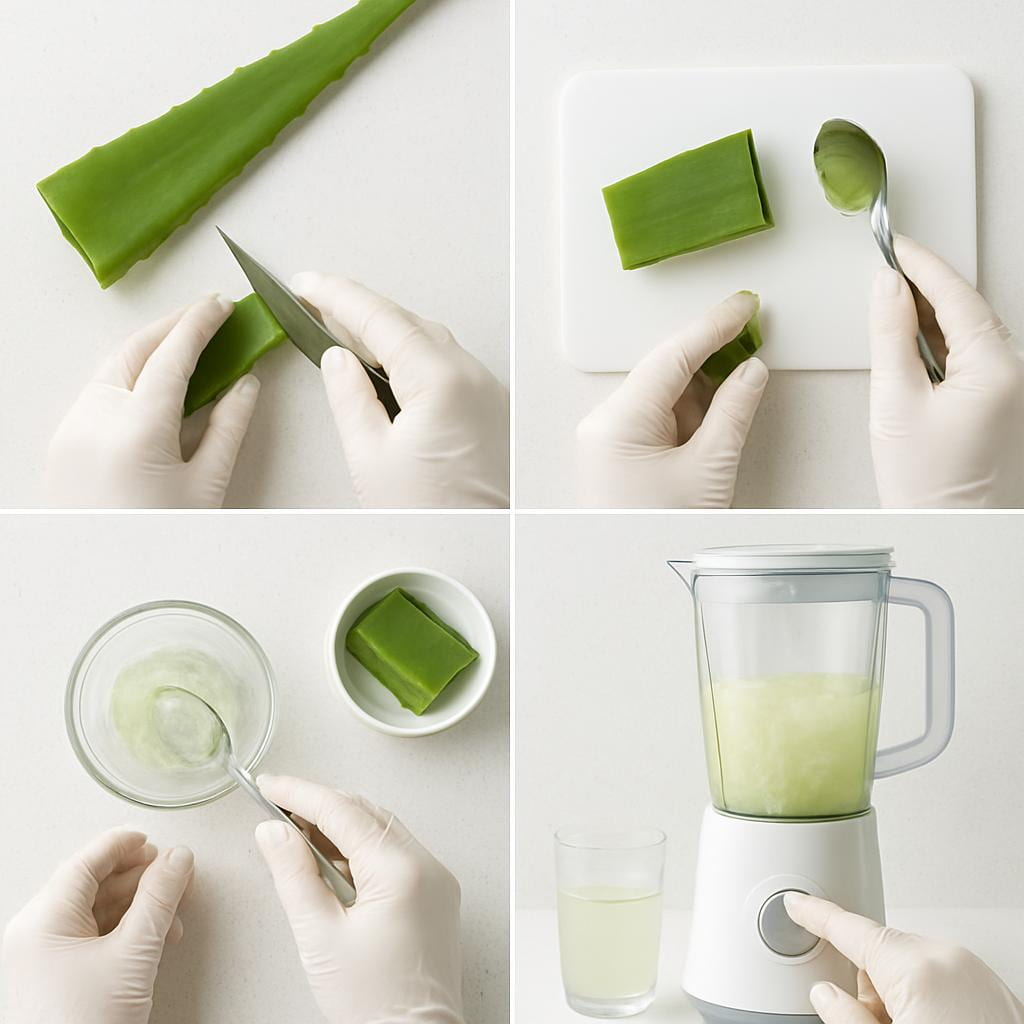
Aloe vera can be used safely when products are pure, decolorized, and properly handled. Always select high-quality sources and follow professional guidance.
Topical Use
- Apply pure inner-leaf aloe gel or dermatologically tested creams to clean, intact skin.
- Use for hydration, minor irritation, or after-sun care.
- Avoid using on deep cuts or severe burns without medical supervision.
(Source: Mayo Clinic – Aloe Vera Overview, 2024)
Oral Consumption
- Choose decolorized, aloin-free aloe juice labeled “purified inner leaf.”
- Limit intake to manufacturer-recommended servings (usually 1–2 oz daily).
- Consult a healthcare provider if you have diabetes, heart, or kidney concerns.
Product Selection
Choosing the right aloe vera product is essential to ensure safety, purity, and effectiveness. Not all aloe products are created equal—some contain alcohol, dyes, or artificial fragrances that may irritate the skin or diminish aloe’s natural benefits.
According to the Cleveland Clinic (2024), consumers should look for products labeled “100% pure aloe vera gel” and avoid formulations that include alcohol, added fragrance, or synthetic dyes, as these ingredients can dry or irritate sensitive skin. This guidance also applies to oral aloe products, which must meet safety and quality standards for internal use.
Storage and Food Safety Tips
Proper storage ensures aloe vera products remain safe and effective while preventing microbial contamination.
According to the U.S. Department of Agriculture (USDA) Food Safety and Inspection Service – Keep Food Safe at Home (2025), perishable plant-based gels should be stored under refrigeration.
Storage Guidelines:
- Refrigeration: Keep fresh aloe gel or juice at ≤ 40°F (4°C) after opening.
- Shelf life: Use within 5–7 days if fresh, or within the manufacturer’s expiration if bottled.
- Container: Store in an airtight glass or BPA-free container.
- Cross-contamination prevention:
- Wash hands and utensils before handling.
- Keep aloe separate from raw meat, poultry, and seafood.
- Sanitize surfaces after preparation.
Tip: If aloe develops an off odor or discoloration, discard it immediately to avoid spoilage.
Frequently Asked Questions (FAQs)
1. Is Aloe vera safe to drink every day?
Small servings (1–2 oz) of decolorized, purified aloe juice may be safe for short-term use, but consult a healthcare provider for long-term consumption.
(NCCIH, 2024)
2. Can Aloe vera support digestion naturally?
Yes. Aloe polysaccharides like acemannan may support gut comfort and hydration, though more studies are needed. Avoid aloe latex products for digestive use.
3. Does Aloe vera help skin stay hydrated?
Yes. Its natural humectant compounds help retain moisture and improve skin elasticity, making it a popular ingredient in moisturizers.
(Mayo Clinic, 2024)
4. What’s the difference between Aloe gel and Aloe latex?
Aloe gel is the clear inner part of the Aloe vera leaf, rich in water, vitamins, and soothing polysaccharides. It’s generally safe for topical or short-term oral use when purified.
(Mayo Clinic, 2024)
5. Is Aloe vera safe during pregnancy or breastfeeding?
Topical aloe gel is typically safe, but oral forms should be avoided unless approved by a healthcare professional, as latex may stimulate uterine contractions.
(NCCIH, 2024)
6. Can Aloe vera interact with medications?
Yes. It may affect drugs that influence blood sugar or blood clotting. Always discuss use with your doctor.
Conclusion
Aloe vera is a nutrient-rich plant with science-backed benefits for skin, digestion, and general wellness.
Its polysaccharides, antioxidants, and vitamins may help support hydration, gut balance, and antioxidant defense—when used safely and in moderation. Always select pure, decolorized inner-leaf products and follow reputable medical or nutrition guidance for best results.
This content is for informational purposes only and not medical advice.
References:
- National Center for Complementary and Integrative Health (NCCIH) – Aloe Vera
- Mayo Clinic – Aloe (Aloe vera) Overview
- MDPI Proceedings (2024) – Anti-Inflammatory and Antioxidant Activity of Aloe Vera Extract in Human Keratinocytes
- Cleveland Clinic – Aloe Vera for Sunburn: What to Look For
